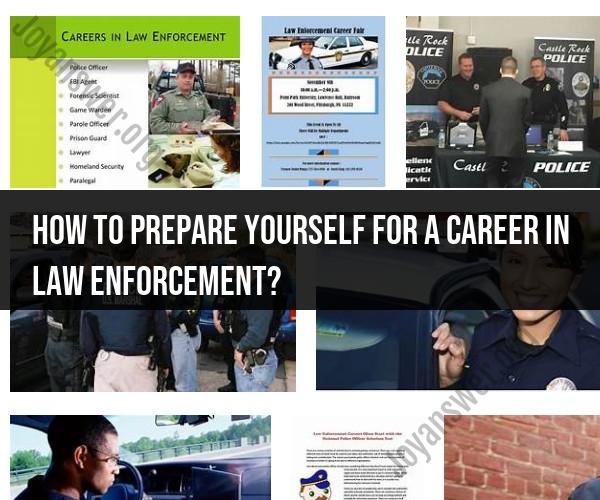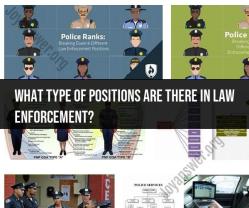How to prepare yourself for a career in law enforcement?
Preparing for a rewarding career in law enforcement requires a combination of education, training, physical fitness, and personal qualities. Here are the essential steps to take if you're interested in pursuing a career in law enforcement:
Education Requirements:
- Obtain a high school diploma or equivalent (such as a GED). Many agencies require at least a high school diploma for entry-level positions.
- Consider pursuing a college degree, such as a bachelor's degree in criminal justice, criminology, sociology, or a related field. While not always required, having a degree can make you a more competitive candidate.
Physical Fitness:
- Maintain good physical fitness. Law enforcement agencies typically have specific fitness requirements, including running, push-ups, sit-ups, and agility tests. Regular exercise and a healthy lifestyle are crucial to meet these standards.
Clean Criminal Record:
- Maintain a clean criminal record. A criminal background check is part of the application process, and any serious convictions can disqualify you from law enforcement careers.
Driver's License:
- Obtain a valid driver's license. Many law enforcement positions require you to operate a vehicle as part of your duties.
Personal Qualities:
- Develop strong interpersonal and communication skills. Law enforcement officers need to interact with the public and colleagues effectively.
- Show integrity, honesty, and a strong sense of ethics. High moral character is essential in this profession.
- Demonstrate resilience and the ability to handle stressful situations calmly.
- Exhibit good judgment and decision-making skills, as officers often face split-second choices.
Research Agencies:
- Research different law enforcement agencies to determine which one aligns with your career goals. Consider factors like location, size, jurisdiction, and specialization (e.g., local police, state troopers, federal agencies).
Acquire Relevant Experience:
- Gain experience that can make you a more attractive candidate. This could involve internships, volunteer work, or part-time jobs in security, public safety, or related fields.
Apply for Positions:
- Check the websites of law enforcement agencies for job openings. Follow their application instructions carefully, which may include written tests, interviews, and background checks.
- Prepare a well-crafted resume and cover letter highlighting your qualifications, skills, and experiences relevant to law enforcement.
Physical Fitness Preparation:
- Train specifically for physical fitness tests required by the agency you're interested in. Seek guidance from physical trainers if necessary.
Written Exams and Interviews:
- Prepare for written exams and interviews by studying common law enforcement interview questions and taking practice exams.
Background Investigation:
- Be prepared for an extensive background investigation. Ensure that your personal, financial, and legal history is accurate and complete.
Academy Training:
- If hired, you will likely need to attend a law enforcement academy. This is where you'll receive comprehensive training in various aspects of law enforcement, including firearms, defensive tactics, legal procedures, and community policing.
Maintain Ongoing Training:
- Law enforcement is a continually evolving field. Stay updated with new laws, procedures, and techniques through ongoing training and professional development.
Pass Required Exams:
- Many agencies require officers to pass periodic exams, such as firearms qualification tests or legal knowledge assessments.
Build Relationships:
- Build positive relationships with colleagues and members of the community. Effective community policing often involves building trust with the people you serve.
Consider Specializations:
- As you gain experience, consider specializing in areas like SWAT, K-9 units, cybercrime, or narcotics investigation, depending on your interests and agency opportunities.
Networking:
- Attend law enforcement conferences and join professional associations to network with other law enforcement professionals and stay informed about industry trends.
Remember that a career in law enforcement can be demanding but highly rewarding. It's essential to stay committed to your training, personal growth, and ethical principles throughout your career to succeed and make a positive impact in your community.



